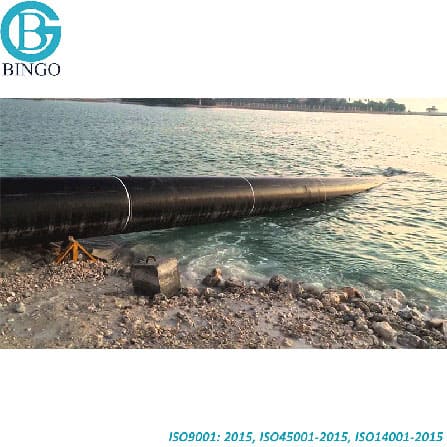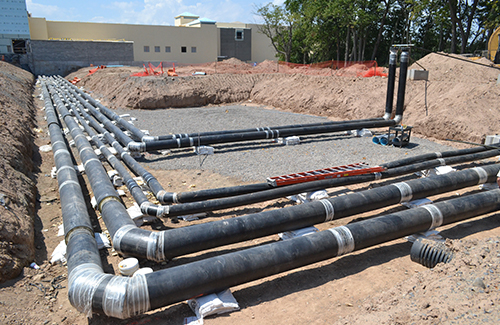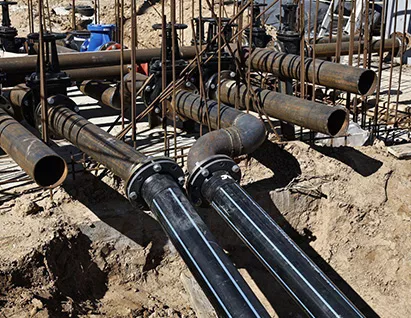How a Pipeline Manufacturer supports long-term infrastructure success
Wiki Article
Checking Out the Leading Pipeline Manufacturers: Quality, Dependability, and Advancement
The pipeline manufacturing market stands at the crossway of innovation, quality, and reliability, driven by leading firms such as Tenaris and Vallourec. These makers are not just dedicated to producing high-performance products however are additionally pioneering sustainable techniques that address modern environmental worries (HDPE Pipe Supplier). As we take a look at the criteria that define quality in pipeline options, it becomes apparent that the landscape is swiftly evolving. What certain technologies are arising, and just how are these improvements forming the future of pipeline facilities? The answers might redefine sector criteria in ways that are not yet fully comprehendedLeading Manufacturers Review
In the domain of pipeline manufacturing, several principals arise as leaders, each adding significantly to the sector's landscape. Firms such as Tenaris, Vallourec, and JFE Steel have actually developed themselves as frontrunners by consistently providing top notch items that fulfill rigorous sector standards. Tenaris, renowned for its ingenious options, focuses on smooth and bonded pipes, providing mostly to the oil and gas industry. Vallourec, a French multinational, focuses on the production of premium tubular solutions, highlighting sustainability and progressed innovation in its manufacturing procedures.Similarly, JFE Steel, a major Japanese manufacturer, is recognized for its considerable series of steel pipelines, especially those utilized in energy and framework jobs. Their commitment to r & d has actually enabled them to create high-performance products that withstand extreme environmental conditions. In addition, business like U.S. Steel and National Oilwell Varco have actually increased their market visibility by diversifying their product offerings and improving functional efficiencies.
These leading suppliers not only control the market however also drive technology within the industry, establishing benchmarks for high quality and dependability that gamers aim to achieve. Their payments are vital for fulfilling the boosting demand for efficient and long lasting pipeline solutions worldwide.
Requirements for Top Quality Evaluation
Quality evaluation in pipeline manufacturing depends upon two vital standards: material sturdiness requirements and producing process performance. Ensuring that products fulfill strenuous sturdiness criteria is necessary for the longevity and reliability of pipelines. Furthermore, enhancing the manufacturing procedure can boost efficiency while keeping top quality, eventually affecting general efficiency and safety and security.Product Sturdiness Standards
Ensuring the durability and dependability of pipeline products is important for maintaining facilities integrity and functional efficiency. Product durability standards play a crucial function in examining the high quality of pipelines, dictating the efficiency and life-span of the products made use of in construction. Manufacturers need to abide by a variety of strenuous requirements, including those set by companies such as ASTM International and the American Oil Institute (API)These standards review various variables, consisting of rust resistance, tensile strength, and exhaustion performance. Pipelines made use of in destructive environments call for products that can stand up to chemical destruction, while those subjected to high-pressure conditions have to show outstanding tensile toughness.
Furthermore, elements such as temperature level variations and environmental conditions should be taken into consideration, as these can greatly affect product actions over time. Manufacturers frequently use sophisticated screening methodologies, including increased aging tests, to imitate long-term wear and assurance that materials surpass or fulfill industry criteria.
Manufacturing Process Efficiency
Manufacturers' capability to maximize manufacturing procedure performance is important for generating premium pipes that fulfill rigid sector standards. Effectiveness in making directly influences expense monitoring, production timelines, and overall item honesty. To accomplish this, leading pipeline producers execute advanced techniques such as lean manufacturing, automation, and real-time information analytics.Lean producing principles are essential in lessening waste and making best use of resource use. By enhancing processes and removing redundancies, makers can enhance efficiency while ensuring constant high quality. Automation modern technologies, consisting of robotics and computer system mathematical control (CNC) equipments, play an essential role in boosting accuracy and minimizing human mistake, consequently raising the reliability of the end product.
Furthermore, making use of real-time data analytics enables producers to keep track of production processes continually, allowing them to determine bottlenecks and make timely modifications. This aggressive strategy not only boosts effectiveness yet also sustains quality assurance methods by making sure compliance with regulatory criteria.
Dependability in Pipeline Solutions
Reliability in pipeline remedies is vital, as it directly influences the security and performance of liquid transport systems. Key variables include the toughness of materials used, adherence to rigorous testing and qualification requirements, and the unification of innovative material services that enhance efficiency. Comprehending these components is crucial for manufacturers intending to supply reliable pipeline facilities.Importance of Toughness
Achieving longevity in pipeline solutions is vital, as it straight affects the lasting efficiency and security of infrastructure. Sturdy pipelines are vital for decreasing upkeep expenses and minimizing the chance of devastating failings. This integrity is especially essential in markets such as oil and gas, water supply, and wastewater administration, where the effects of pipeline failure can be severe, both economically and ecologically.The products and manufacturing processes utilized by pipeline suppliers play a considerable role in determining the toughness of the end product. Making use of high-grade raw products, progressed technologies, and innovative layout principles assures that pipes can stand up to various stressors, consisting of stress fluctuations, temperature variations, and harsh environments.
Moreover, the durability of pipes is very closely connected to their ability to stand up to exterior variables such as dirt motion, seismic task, and chemical exposures. Efficient corrosion security methods, such as finishings and cathodic protection, further boost the durability of pipes, safeguarding them versus degeneration in time.
Purchasing sturdy pipeline options ultimately equates to increased operational performance, decreased downtime, and boosted safety and security, attesting the important relevance of toughness in modern pipeline manufacturing.
Testing and Certification Standards
In the domain name of pipeline services, rigorous screening and accreditation requirements are important to guarantee the dependability and safety of facilities. These criteria act as standards for evaluating the performance and toughness of pipeline products and systems, verifying they fulfill certain regulatory and market demands.Evaluating procedures normally include numerous techniques, consisting of stress screening, hydrostatic evaluations, and non-destructive testing techniques. These assessments are important for recognizing possible weaknesses or issues in the materials prior to they are released in real-world applications. In addition, certification by identified companies warranties that suppliers adhere to established guidelines, which cultivates depend on amongst stakeholders, consisting of engineers, end-users, and professionals.
Several prominent pipeline producers participate in continuous surveillance and enhancement of their screening protocols to adapt to progressing industry requirements and technical improvements. Compliance with criteria such as ASTM, ASME, and ISO not just enhances item dependability but likewise minimizes the risk of environmental cases connected with pipeline failings.
Ingenious Product Solutions
The advancement of innovative product services has actually transformed the landscape of pipeline manufacturing, boosting both performance and longevity. Advanced products such as high-density polyethylene (HDPE), cross-linked polyethylene (PEX), and composite products have arised as game-changers, offering remarkable resistance to corrosion, temperature variations, and stress variants. These materials not only prolong the life expectancy of pipelines but also reduce upkeep expenses, guaranteeing reputable long-term performance.Manufacturers are increasingly adopting smart materials that integrate sensors for real-time surveillance. This technology permits for proactive maintenance, considerably enhancing integrity by discovering leaks or architectural weak points prior to they intensify right into essential failures. The integration of nanotechnology has actually also brought about the advancement of coverings that boost the resilience of pipes against abrasion and chemical direct exposure.
Sustainability is one more vital focus, with makers exploring bio-based composites and recyclable materials that decrease ecological influence. As regulative standards proceed to develop, the focus on ingenious product options ends up being extremely important in conference stringent safety and security and ecological needs. Inevitably, these improvements not only enhance the integrity of pipeline systems but likewise add to the overall efficiency and sustainability of power transport infrastructures.
Developments in Pipeline Modern Technology
Developments in pipeline modern technology are changing the industry by improving effectiveness, safety and security, and environmental sustainability. Recent advancements concentrate on clever pipeline systems that utilize sensors and IoT modern technology to keep an eye on problems in genuine time, enabling aggressive maintenance and minimizing the threat of failings. These systems can detect leakages, stress modifications, and other anomalies, permitting quick feedback and decreasing ecological effect.Furthermore, the advancement of innovative materials, such as composite and corrosion-resistant alloys, considerably prolongs the lifespan and dependability of pipes. Pipeline Manufacturer (American Plastics LLC HDPE Pipeline Manufacturer). These products reduce upkeep expenses and enhance performance in harsh settings, making them suitable for water, gas, and oil transport
In addition, automation and robotics are playing a vital role in pipeline construction and assessment. Drones and robot tools promote studies and analyses of hard-to-reach areas, making sure detailed inspections without endangering safety.
Moreover, ingenious layouts, such as modular pipeline systems, permit better flexibility in installment and modification, satisfying the vibrant demands of the power industry. With each other, these technological improvements not only enhance functional effectiveness yet likewise add to a much more lasting and resilient pipeline facilities, leading the way for a greener future.
Study of Success
Across numerous industries, successful executions of innovative pipeline innovations show considerable renovations in operational efficiency and security. One noteworthy situation is the deployment of wise pipeline surveillance systems in the oil and gas market, where real-time information analytics have decreased leak detection times by over 50%. This not just minimizes ecological threats yet also improves the total stability of pipeline framework.
In addition, a major manufacturer executed robot examination technologies in its pipeline maintenance operations, resulting in a 40% improvement in assessment efficiency. This strategy has streamlined upkeep timetables and substantially decreased downtime.
These case research studies highlight exactly how leading pipeline makers are leveraging sophisticated technologies to foster reliability and operational quality, inevitably setting new requirements for the market. As these successes proceed to unravel, they lead the way for further improvements in pipeline manufacturing and monitoring.

Ecological Sustainability Practices
Regularly, pipeline makers are focusing on ecological sustainability techniques to alleviate their ecological footprint and boost the durability of their items. This dedication is shown in various initiatives focused on reducing waste, conserving power, and using look at this now lasting materials throughout the manufacturing process.
Numerous producers are adopting advanced modern technologies that lessen emissions and power intake. As an example, the assimilation of automated systems and energy-efficient equipment aids simplify production while lowering dependence on nonrenewable fuel sources. Furthermore, business are significantly turning to eco-friendly materials, such as recycled steels and bioplastics, which not only decrease the ecological effect yet additionally advertise a round economic climate.
Additionally, pipeline makers are carrying out strenuous lifecycle assessments to examine the ecological implications of their products from beginning to disposal. This strategy allows them to determine possibilities for renovation and foster liable sourcing and waste administration techniques.
Partnership with ecological organizations further boosts these initiatives, as producers look for to straighten their operations with worldwide sustainability objectives. Eventually, these environmental sustainability methods not only add to a healthier world however additionally setting manufacturers as liable leaders in the market, attracting ecologically conscious stakeholders and clients alike.
Future Trends in Pipeline Manufacturing
As the need for extra sustainable and effective facilities grows, pipeline manufacturing is positioned for significant innovations that will certainly reshape the sector. Secret patterns prepared for in the coming years consist of the integration of innovative materials, such as composite and corrosion-resistant alloys, which improve durability while minimizing environmental impact. Manufacturers are also anticipated to adopt ingenious production methods, like additive manufacturing and automation, to streamline procedures, reduce waste, and lower expenses.Moreover, the rise of smart pipeline modern technologies, integrating sensing units and IoT gadgets, will certainly allow real-time surveillance and predictive upkeep, consequently enhancing security and operational effectiveness. This electronic transformation will not only enhance source monitoring yet also help with conformity with rigid environmental guidelines.
Sustainability will continue to be a central focus, driving producers to invest in environmentally friendly practices, consisting of energy-efficient manufacturing techniques and recycling campaigns. As the global emphasis on climate change escalates, pipeline manufacturers will need to adjust by developing options that satisfy both ecological and economic needs.
Frequently Asked Questions

What Industries Largely Make Use Of Pipeline Products From These Manufacturers?
Pipeline products are mainly made use of in markets such as oil and water, gas and wastewater management, chemical processing, mining, and construction. These markets count on efficient, resilient, and safe transportation of liquids and materials.
How Do Manufacturers Make Sure Compliance With International Pipeline Requirements?
Manufacturers assure compliance with global pipeline requirements by carrying out strenuous quality assurance processes, conducting regular assessments, adhering to established governing frameworks, and spending in worker training to promote understanding and understanding of safety and security and quality demands.What Is the Typical Life-span of Pipelines From Leading Manufacturers?
The ordinary life-span of pipes from leading suppliers generally varies from 30 to 100 years, relying on product, environmental problems, and maintenance techniques. HDPE Pipe Supplies Midland TX. Regular assessments and adherence to market standards considerably affect longevity and efficiencyExist Certifications Certain to Pipeline Production Quality?
Yes, various qualifications exist for pipeline manufacturing quality, including ISO 9001 for quality monitoring systems and API requirements particular to pipelines. These accreditations ensure adherence to strenuous safety and security, performance, and environmental standards within the sector.How Do Manufacturers Take Care Of Pipeline Upkeep and Fixes?
Manufacturers generally carry out a proactive maintenance approach that consists of routine examinations, monitoring systems for very early discovery of problems, and an organized fixing procedure. This strategy assurances pipeline integrity, lessens downtime, and boosts total functional performance.Quality analysis in pipeline manufacturing hinges on 2 important standards: product sturdiness requirements and manufacturing procedure performance - HDPE Pipe Supplier. Product durability requirements play an important duty in reviewing the quality of pipelines, dictating the performance and lifespan of the products utilized in building. The products and manufacturing processes employed by pipeline suppliers play a substantial duty in identifying the durability of the final item. The average life-span of pipelines from leading producers normally varies from 30 to 100 years, depending on product, ecological conditions, and upkeep methods. Yes, various accreditations exist for pipeline manufacturing top quality, including ISO 9001 for quality management systems and API requirements particular to pipelines
Report this wiki page